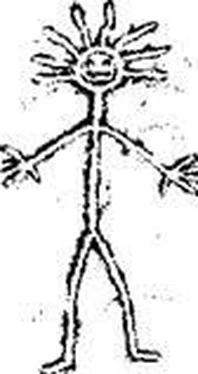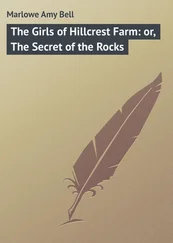Juna pointed from her suit to Oliver’s, turning a deep, questioning purple. The alien watched her, and shook its head. On its chest two figures in suits appeared. They were lying on the ground. Green aliens appeared; the suits faded away. One of the figures was pink, the other brown. Spiral pointed from Oliver’s suit to the pink figure on its own chest. As Juna watched, the pink figure turned pale silver, the color of death. The aliens carried the brown figure away, leaving Oliver behind. Spiral pointed to Oliver’s suit and shook its head again.
Oliver was dead, Juna realized. Oliver had been the tough one, the survival expert, but she had outlived him. He had been so patient with ~jer. always giving her a word of encouragement when things were tough. She remembered his compassion when the botanist Hiro, their final surging crewmate, had died. Oliver had held him, talking gently, sooth-ngly, as Hire’s breathing grew more and more labored. Then, after they had laid Hiro out and covered his dead body with leaves, he had held her, je’.img her cry out her grief and fear. Remembering, Juna was unable to sop the stinging tears of grief and loneliness.
A cool hand brushed her shoulder and she looked up. It was Spiral, :chre with concern.
Juna felt suddenly angry. She didn’t want the alien’s concern. She •anted to be home again and safe. It didn’t understand; it couldn’t understand her. It was an alien.
Then she remembered how Spiral had hissed at her during the funeral, when she had tried to offer sympathy to it. She smiled. Neither of them understood the other. At least they had that in common. She clasped the alien’s hand.
“Thank you,” Juna said aloud. She tried to make her skin express her “Jnanks, but produced only garbled waves of color.
The alien flushed dark green. It picked up Oliver’s suit, folded it, and neld it out to her. She smiled and took it. She would take the suit back with her, so that the Survey could give it to his family.
Spiral rummaged through a pile of nets. It pulled out her pack and Driver’s. Juna opened them, taking out ordinary human artifacts, which were priceless treasures now. There were maps, her multipurpose knife, a first aid kit, a radio, sealed packages of rations, extra clothes, a canteen, a tent. Down at the bottom, folded into a compact oval, was her computer.
Juna turned on the radio. There was nothing, not even static. She opened the case with the screwdriver on her knife.
“Farraddbenge!” she muttered in Amharic, when she had pried the case open. The radio was packed with fluffy black mold, the chips blackened and useless. She tried Oliver’s radio, but it didn’t work either. Spiral picked up the useless radio and examined it, ears wide with curiosity. Juna frowned; allowing the alien to examine the radio was a breach of Contact Protocols, but she could see no tactful way of stopping it.
Juna unfolded the computer. It came alive with a polite chime as she activated it. Relief flared on her skin. At last she could record her observations. The computer would be a powerful tool to help her unravel the aliens’ language. Spiral’s ears lifted and it flushed pink in surprise. Juna smiled, then frowned as she realized a working radio would be more useful than a working computer. The Survey had tried for years to incorporate a radio into the nanocomps, but they needed too much power, especially on a planet like this, where radio reception was problematical at best. Even if the radio had worked, she probably couldn’t have reached the base. At least she had her computer.
Juna brightened the screen and peered at the familiar menu of configuration options, a status report on the computer’s condition, and the time and date.
“Perkele!” Juna muttered in Finnish as she saw the date on the computer screen. It was much later than she had thought. She checked the activity file, fighting back a wave of fear. The clock had not been reset since she had first arrived on board ship. In desperation she scrabbled through Oliver’s pack, and checked the date on his computer.
The clocks were running within a second of each other. The survey flyer had crashed in the jungle sixty-four days ago. Base camp would be dismantled in a week’s time. In another three days, the mother ship would leave orbit. If she didn’t hurry, she would be marooned here forever.
Anito paused to catch her breath. They had been traveling for five days now. Ninto had been right. She should have waited a few more days before leaving. Her body was still changing, drawing on her scant energy reserves. Even the creature’s cautious pace exhausted her. Her body ached all over. She wanted to hide somewhere and sleep for a week.
During the allu-a Ilto did with the new creature on its first night in the village, he had dampened its panic response, and improved its reflexes. It no longer froze in terror when it looked down, but it was still learning to trust its new reflexes. Driven by the sudden urgency that blossomed when the creature found that noisy dead-but-alive box, it learned quickly. Every day it traveled faster, moved with more confidence. Unfortunately, the new creature was learning faster than Anito was healing.
Anito’s tired body protested as she leaped to the next tree, where the creature was waiting for her. Slanting bars of golden light pierced the canopy. It was getting late. Anito could smell the rich sour scent of a nearby tree full of ripe geramben. She was intensely hungry. If they stopped here for the night they would eat well with relatively little effort. Tomorrow morning they could gather supplies for the next few days of the trip. It would give her a chance to rest and recover her strength.
Anito put a hand on the creature’s shoulder, communicating by gesture and skin speech that they would stop here. She led it to the geramben tree, showed it how to recognize which fruit were ripe, and left the new creature to gather fruit while she hunted. Hanging her bag of gear on one of the branches, she took with her a gathering bag and her blowgun and darts.
The hunting was good. Here in the wild spaces between village territories there were no restrictions on what she could kill. She soon bagged two fat ooloo and was stalking a garban when she smelled the other Tendu. He was male, and had passed this way very recently. She shot at the garban and missed, then began tracking the Tendu, following his scent through several trees. She heard a rustling behind her and then something brushed her shoulder. Startled, Anito leaped up to another branch before looking back. It was the Tendu she had been tracking. He was taller than any Tendu she had ever seen. Judging from his height and the length of his muzzle, he must be extremely old. Ripples of laughter coursed across his body.
“I am Ukatonen,” he told her. “What takes you from Narmolom so soon after werrun? You should be home resting.”
Anito drew back her head in surprise. He had the fourfold name sign of an enkar. The enkar passed from village to village, settling disputes. They were hundreds of years old, and reputed to have strange powers. They moved through the forest more silently than the wind. He had approached her without her knowing; that hadn’t happened since she was a tinka. He even knew what village she was from. She was impressed and a little frightened.
Anito had seen only a few enkar. One had come after their last chief elder died. She had chosen Ilto to fill the chief elder’s place. Once in a while, one would show up at the village, stay a few days, and then move on. They were treated with great respect and given the best that the village had to offer. To do otherwise would mean great loss of face for the entire village.
“What’s your name?” Ukatonen asked.
Читать дальше












